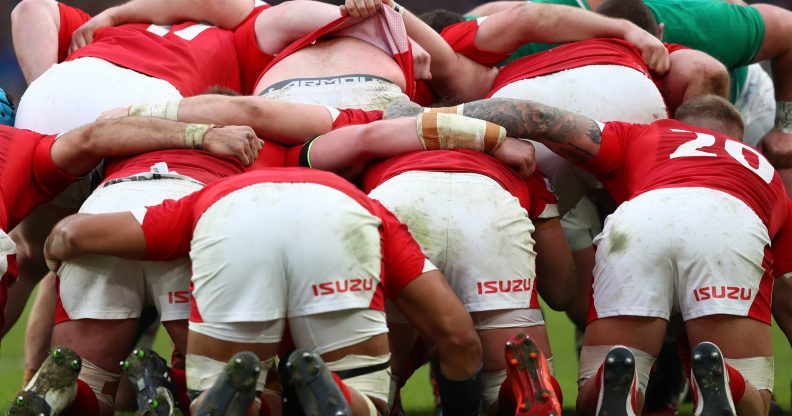Two thirds of male rugby players have heard their teammates use homophobic slurs, eye-opening study finds

This is the second time the WRU has come under criticism for anti-LGBTQ+ behaviour. (Getty/Michael Steele)
Two thirds of male rugby players have heard their teammates use homophobic slurs in the past fortnight, while nearly half admitted to using the language themselves, according to a new study.
The study asked male players if they had heard teammates use the slurs ‘fag’ and ‘dyke’ within the last two weeks, to which 69 per cent answered that they had. A further 69 per cent said that they want it to stop.
Researchers said the language doesn’t appear to be motivated by any malice or prejudice toward gay people, as many of the players expressed positive attitudes the LGBT+ community. 67 per cent claimed to have at least ‘one’ close gay friend.
Players reported that the language is motivated by peer pressure and typically used to ‘fit in’ on their team, and most did not realise how problematic the words are.
“It is surprising to see a near total disconnect between the homophobic language being used by rugby players, and their attitudes to gay people,” said Erik Denison, one of Monash University’s researchers.
“Most rugby players say they use the homophobic language to get a laugh out of others, or fit in on their team, and it seems they don’t realise how harmful this language is to gay people, or to the team culture generally.
“It was very interesting to see most want the language to stop being used, but don’t realise everyone else on their team feels the same way.”
The research was conducted by Australia’s Monash University and backed by premiership rugby club Harlequins. The findings will be used to develop evidence-based programmes to stop the use of slurs and derogatory jokes about LGBT+ people in all sports.
Marc Leckie, head of The Harlequins Foundation, said: “It is really important for all of us at The Harlequins Foundation to support and highlight the significance of this incredibly important research, and moving forward we hope to make a positive difference through role modelling and education that challenges the barriers that member of the LGBTQ+ community face in participating in sport.”
Homophobic behaviour in rugby and other sports.
Homophobia remains a pervasive problem in sport, despite many authorities’ attempts to stamp it out.
A recent UK parliament inquiry had “serious concerns” about the mental and physical effect of homophobic language on LGBT+ youth, including low sport participation rates among gay and bisexual boys, who play team sports at half the rate of other boys.
Further research by Sport England found girls avoid ‘traditionally male’ sports like rugby because of stigma that only ‘lesbians’ play the sport. This stigma is continually reinforced by jokes and slurs.
The problem is particularly prevalent in football, and has grown so bad that the former Welsh rugby captain Gareth Thomas, who is gay, recently urged Boris Johnson to tackle the “black hole in the law” around homophobic football abuse.
Homophobic football fans already face immediate bans in Belgium, while in France the referees are instructed to stop play if any homophobic insults or chants are heard.
Earlier this month West Ham became the first UK football club to threaten homophobic football fans with a lifetime ban on all their matches, saying they have a “zero-tolerance” approach to any form of discrimination.

